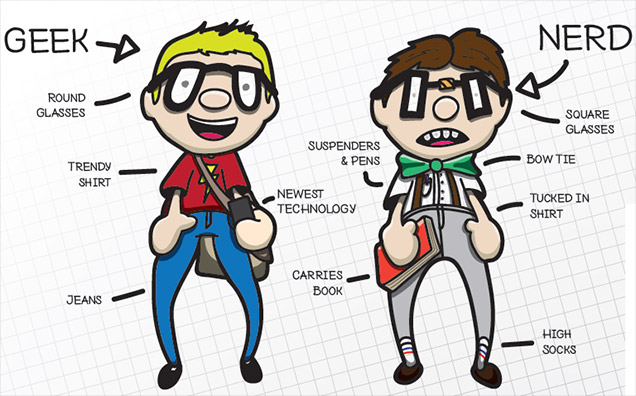What is a geek?

Ask someone who has yet to begin watching Game of Thrones why they haven’t started watching yet, and many people give the age-old excuse of “It’s just too far in now, I’ll never catch up.”
Not getting involved at the beginning of a story can be a difficult hurdle to overcome, and if 40 hours of television is too much for people to handle, imagine being faced with a backstory that spans more than 40 years.
This is the precise problem that has plagued the comic book industry for so long, and one that has become far more prevalent today when comic book properties such as The Walking Dead, Watchmen and a hat full of superheroes exploding into every facet of mainstream media, bringing new and interested faces through the doors of comic book shops around the country, only to discover that the stories of Batman or the Avengers can trace their starting points to some point before most of their parents were born.
The prospect of slogging through hundreds of comics, some of which are practically impossible to find nowadays, is a daunting one even in the eyes of the most enthusiastic collector, leaving potential readers behind and giving comics a reputation for being one of the less accessible storytelling mediums.
“I wouldn’t say they’re totally inaccessible, and definitely not anymore,” said Tim Morris, the third owner of e Comic Book Collector, located on Dundas Street in downtown London.
As the operator of one of London’s most popular comic book stores, Morris has seen people walk through his door ranging from comic book noobies to 60-year-old men showing up to pick up a monthly order and recognizes that it is important that the comic book industry embrace readers of all kinds.
“With the big two – DC and Marvel – they’re trying to make it as accessible as possible, especially DC who two years ago, rebooted their entire universe. Everything got reset back to number one, even books that were in their mid-800’s like Action (the book telling the story of Superman), which had been running since 1938,” he said.
For a well-known brand like DC Comics to essentially scrap their history was an unprecedented move, and one that had the very real potential to isolate people that have supported and followed these characters and stories for significant parts of their lives.
“It actually worked really well,” Morris said about a potential drop in readership. “DC’s numbers have never been so high at our store, traditionally they had always been second to Marvel but that has reversed in the last while.”
Opening the doors for a fresh generation of readership proved to be an inspired choice, as it saw the publisher receive an instant spike in sales, before leveling out into some far more stable numbers over the last year.
“If Marvel were really smart they would do the same thing,” joked Morris. “But they’ve been a bit spottier in trying to reboot some of their titles, but they used to do that every couple of years, pick a few books and say, ‘Hey these are now back to number one.’”
Resetting what was once an interlocking continuity and not just for one particular hero, is something that Morris is not particularly fond of.
“Judging by the people coming through my store, it was the worst possible way thing for them to do, and not I have Marvel guys jumping ship to read DC, which in years past was unheard of, you read one or the other and you didn’t touch the other,” Morris said.
While Marvel and DC are household names in the comic industry, there are a number of smaller publishers that are also beginning to absorb some of their falling readership.
“The readers that aren’t jumping ship to the big competitor are looking toward smaller companies like Image, Dark Horse or IDW, it’s a big change and I’m quite surprised to see it happen,” explained Morris.
With major changes occurring within the comic book industry, and comic-based entertainment properties such as The Walking Dead and any of the über-successful Marvel movies more popular than ever before, it seems the perfect time for new readers, and those who are looking to get back into stories that they were perhaps familiar with as children, to hop into collecting with both feet.
Morris was a bit less certain about the best way for a new reader to attempt to get involved. The method can vary depending on which title the reader is going for.
“If you’re attempting to get into a more recent title, than buying issue by issue can certainly offer the classic collecting experience, but if you were attempting to collect The Walking Dead it’s easier to go back and buy the trades to catch up with the last 10 years of story,” he said.
The rise of trade paperbacks has also benefitted the sales of monthly issues.
“People read the trades and get caught up to the current point, only to realize that it’ll be six months before the next collection is out, so lots of the readers end up picking up an issue because they can’t bear to wait!”
Morris, is hoping that the rising interest in comics continues, as it can only mean positives for a genre that a decade ago, was seen as a bit of a joke in mainstream entertainment, yet now plays a crucial role in shaping what we see on our screens.
“I think it’s great,” he said. “People are becoming more interested and accepting of comics than ever before, last summer’s Free Comic Book day was our busiest ever, and this year’s was packed despite the rain.”
Morris was supremely confident that he could point a rookie down the right path find the reader what he/she wants, ensuring shop is always welcoming to comic fans of all knowledge and a perfect place to begin one’s exploration of the genre.













